July 15, 2021
Thank you Mr. President,
At the outset, I would like to congratulate H.E. Mr. Jean-Yves Le Drian, Minister for Europe and Foreign Affairs of France, for chairing this High level ministerial meeting on Libya. I also thank Special Envoy Mr. Jan Kubis for his informative briefing.
2. I would also like to welcome H.E. Mr. Abdul Hamid Dbeibeh, Prime Minister of Libya, other Ministers present, the Secretary General of the Arab League, for joining today’s briefing.
3. I would like to take this opportunity to congratulate Germany for hosting the 2nd Berlin Conference on Libya last month. We fully support its conclusions.
4. There has been a sense of cautious optimism with regard to the situation in Libya over the last few months, especially since the signing of the Ceasefire Agreement on 23 October 2020. The Council witnessed and welcomed the political progress achieved, including establishment of the Government of National Unity charged with the conduct of elections on 24 December 2021.
5. However, as we heard from the Special Envoy, despite the progress, there are still causes for concern. The security situation remains fragile despite a reduction in violence. The adverse impact of the conflict on the economy has been exacerbated by the pandemic and disintegrating financial institutions. The involvement of external forces in the internal affairs of Libya has negatively impacted the progress on the political track.
Mr. President,
6. The next six months will be critical for Libya, as it embarks on a journey towards peace and stability. It is incumbent upon the international community and the Security Council, in particular, to continue to provide support to Libya in this critical phase. Today’s meeting will, therefore, help in conveying a message to all stakeholders in Libya. In this regard, I would like to make the following suggestions:
(i) One, elections need to be held as planned on 24 December 2021 in a free and fair manner. In order to achieve this, it is vital that the constitutional basis for conducting elections is agreed upon early. Regrettably, consensus in this regard is still elusive. The Libyan parties and, in particular, the members of the Libyan Political Dialogue Forum (LPDF), need to continue consultations among themselves in order to arrive at a workable solution at the earliest. We would also urge the House of Representatives and the High Council of State to frame required legislation for the conduct of elections. At the same time, we encourage the High National Elections Commission to prepare decisively for the upcoming elections.
(ii) Two, the sovereignty, independence, unity and territorial integrity of Libya needs to be safeguarded. The peace process must be fully Libyan-led and Libyan-owned with no imposition or external interference. We also encourage all Libyan parties to continue to make concerted efforts towards the unification of all national institutions. In this regard, we welcome the independent audit of the Central Bank.
(iii) Three, the provisions of the Ceasefire Agreement and successive Security Council resolutions need to be respected. Unfortunately, these provisions, in particular, those related to the withdrawal of foreign forces and mercenaries, continue to be violated. It is equally alarming that the arms embargo continues to be blatantly violated, as repeatedly reported by the Panel of Experts. There needs to be a serious discussion within this Council on what further measures could be taken to ensure that the decisions of the Council on the withdrawal of foreign forces are implemented, so that sustainable peace and stability prevails in Libya.
(iv) Four, we must ensure that terrorist groups and affiliated entities are not allowed to operate unchallenged in Libya. The continued presence and activities of ISIL in Libya, as illustrated by the latest report of the Analytical Support and Sanctions Monitoring Team of the 1267 Committee, is of serious concern. The report indicates spread of such activities into the Sahel region as well. Libya has become a logistics platform for Al Qaida affiliates in Mali. This is a matter of grave concern due the potential cascading effect it could have throughout the Sahel region. It is unfortunate that the issue is not drawing the attention it deserves. The international community must speak in one voice against terrorism in all its forms and manifestations.
(v) Five, we need to plan for the disarmament, demobilization and reintegration of armed groups and non-state armed actors. We appreciate the fact that UNSMIL is prepared to render assistance to Libya in this process.
(vi) Finally, an inclusive and comprehensive national reconciliation process is the need of the hour. We hope that all parties concerned would engage sincerely in this endeavour. We also urge the international community to support such a process.
Mr. President,
7. India has traditionally enjoyed close and mutually beneficial ties with Libya. The contributions made by Indian enterprises and professionals in critical sectors like energy, manufacturing, education and health care continue to support the Libyan economy and society to this day. India remains committed to supporting Libya and the Libyan people in their endeavor to bring about lasting peace in the country. To this end, we look forward to working with the Government of National Unity for providing capacity building and training assistance in mutually identified areas.
I thank you, Mr. President.

